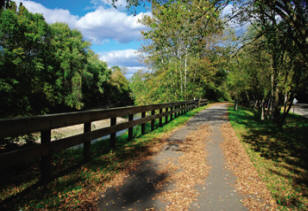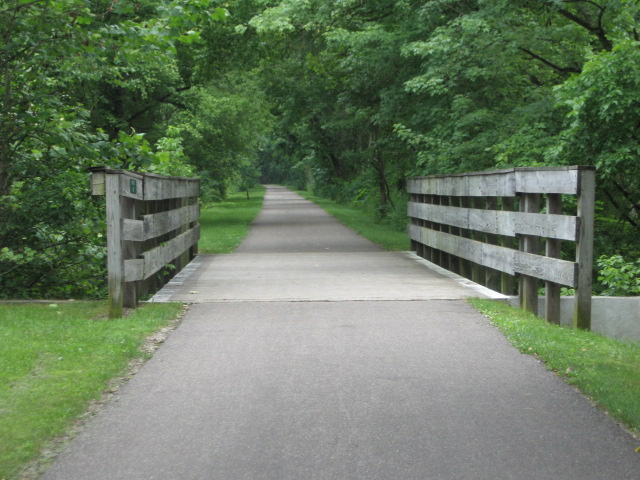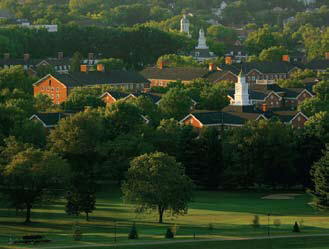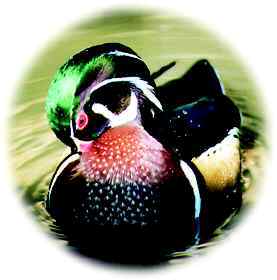Hockhocking Adena Bikeway
 We
invite you to explore the
bikeway's history and beauty by
bike, foot, wheelchair,
rollerblades or other forms of
non-motorized transportation (no
horseback riding permitted.) We
invite you to explore the
bikeway's history and beauty by
bike, foot, wheelchair,
rollerblades or other forms of
non-motorized transportation (no
horseback riding permitted.)
The Hockhocking Adena Bikeway
is located on the old Columbus
and Hocking Valley Railroad bed.
Construction of the rail line
between Columbus and Athens was
completed in July 1870.Before
the railroad, it was a towpath
alongside the Hocking Canal ,
built between 1829 and 1842,
which moved agricultural
products and other goods to
Carroll, Ohio, where it joined
the Ohio-Erie Canal. The canal
had 26 locks, seven culverts,
and one aqueduct crossing Monday
Creek south of Nelsonville. ,
built between 1829 and 1842,
which moved agricultural
products and other goods to
Carroll, Ohio, where it joined
the Ohio-Erie Canal. The canal
had 26 locks, seven culverts,
and one aqueduct crossing Monday
Creek south of Nelsonville.
Repeated flooding,
especially in the late 1800's,
severely damaged portions of the
canal, and the railroad became
the favored mode of
transportation. Today, remnants
of the canal basin are visible
from the bikeway particularly
from Armitage north to Chauncey
(between miles 5 and 10). |
 Safety
Tips and Guidelines Safety
Tips and Guidelines
-
Stay to the
right
-
Pass on the
left-slow down and call out before
passing
-
Use caution at
all intersections and obey all traffic
signs
-
Wear brightly
colored clothes to alert motorist and
hunters
-
Respect private
property and do not trespass
-
Keep dogs
leashed and curbed
-
Carry out what
you carry in
-
Leave plants
and flowers intact
 Access
Points with Parking Available Access
Points with Parking Available
-
Mile 0- East State St. Recreation Area
on East State St. in Athens
-
Mile 4- West State St. Ball Fields on
West State St. in Athens
-
Mile 10.2- off of SR 682 in The Plains
(limited parking)
-
Mile 16.2- Robbins' Crossing/Hocking
College on Hocking Parkway in
Nelsonville
 Ohio
University: miles 1-3 Ohio
University: miles 1-3

Chartered in 1804,
Ohio University was the first university in
the Northwest Territory. Nestled along the
Hocking River, Ohio University boasts
historic architecture, brick streets and
tree-lined walkways. Today over 19,000
students are enrolled at the Athens campus.
 The
Armitage House: mile 5.5 The
Armitage House: mile 5.5
Built in 1832 from
bricks made on the farm, the Armitage House
was originally a "bank" house, with the main
entrance on the second floor. In the early
1900s, the Armitage family opened up two
more rooms in the downstairs, and put in a
central hall and stairway, furnace and
bathroom. Water was supplied by a
windmill-operated well that pumped water to
a cistern on the hill behind the house.
Gravity then carried the water to the house.
Over the years, three families have lived in
the house - the Armitage, the Balls, and the
DePues.
 Eclipse
Company Town: mile 7.1 Eclipse
Company Town: mile 7.1
An historic coal
company store and grouping of former miners'
homes lie to the west of the bikeway at mile
7.1. This site is one of the best examples
of company town architecture remaining in
Ohio. A mine opening farther north near mile
14.5 helped supply some of the 2.5 million
tons of coal mined in Athens County between
1820 and 1993.
 Beaumont/Salina:
mile 10.2 Beaumont/Salina:
mile 10.2
Originally platted
as Tyler, the town of Salina was home to
Milbury M. Green, a major player in bringing
the Columbus and Hocking Valley Railroad to
the region. He and partner George Gould
owned Salina's salt and coal mines. In its
heyday, Salina was second only to Chauncey
in regional salt production. In 1860, Salina
boasted a population of 88. The salt and
coal mines stopped production in the late
1880s, and after 1895, the town became known
as Beaumont.
 Wayne
National Forest: miles 12-14 Wayne
National Forest: miles 12-14
The Wayne National
Forest covers more than a quarter million
acres of Appalachian foothills. Covered with
hardwood and pine, the rugged hills of the
Wayne also feature several rock shelters,
natural springs and abundant wildlife. The
Wayne National Forest covers more than a
quarter million acres of Appalachian
foothills. Covered with hardwood and pine,
the rugged hills of the Wayne also feature
several rock shelters, natural springs and
abundant wildlife.
|

 Flora
and Fauna Flora
and Fauna
Natural wonders can be seen
during all four seasons. The
fertile valley along the
bikeway also produces corn,
hay, and soybeans. View high
cliffs and rock outcrops
between miles 13 - 13.5 and
14.5 - 15. Outstanding
displays of Spring
wildflowers can be found
especially between miles
10.5 - 13.5. The
wildflowers, which are best
viewed from late March
through early May, include
Bloodroot, Hepatica, Wild
Geranium, Dutchman's
Breeches, Large-flowered
Bellwort, Phlox, Virginia
Bluebells, Solomon's-seal,
Canada and Yellow Violets,
Blue-eyed Mary, Toothworts,
Bishop's Cap, three species
of Trillium and many others
intermixed with Maidenhair
and Wood Ferns. Autumn also
ushers in spectacular fall
foliage viewing along the
bikeway.
 Watch
nesting Prothonotary
Warblers between miles 8
8.5. Other birds to look out
for include Bluebirds,
Cardinals, Wood Ducks, Wild
Turkey, Red-tailed Hawks,
Turkey Vultures,
Yellowthroats, Indigo
Buntings, Pileated
Woodpeckers and many more.
In addition to the various
bird species you may
encounter, watch for
cottontail rabbits,
chipmunks, mink, gray
squirrels, deer, fox, and
snakes along the way. Watch
nesting Prothonotary
Warblers between miles 8
8.5. Other birds to look out
for include Bluebirds,
Cardinals, Wood Ducks, Wild
Turkey, Red-tailed Hawks,
Turkey Vultures,
Yellowthroats, Indigo
Buntings, Pileated
Woodpeckers and many more.
In addition to the various
bird species you may
encounter, watch for
cottontail rabbits,
chipmunks, mink, gray
squirrels, deer, fox, and
snakes along the way.
 The
wildflowers are best viewed
in April and early May. They
include Bloodroot, Hepatica,
Wild Geranium, Dutchman's
Breeches (shown here),
Bellwort, Phlox, Bluebells,
Solomon's-seal, Canada and
Yellow Violets, Blue-eyed
Mary, Toothworts,
Bishop's-cap, three species
of Trillium, and many
others, intermixed with
Maidenhair and Wood Ferns.
Wildflowers are easily
damaged by foot-traffic;
please be careful not to
trample the plants when
examining or photographing
them. It should go without
saying that wildflowers must
not be picked! Leave them
for others to enjoy. The
wildflowers are best viewed
in April and early May. They
include Bloodroot, Hepatica,
Wild Geranium, Dutchman's
Breeches (shown here),
Bellwort, Phlox, Bluebells,
Solomon's-seal, Canada and
Yellow Violets, Blue-eyed
Mary, Toothworts,
Bishop's-cap, three species
of Trillium, and many
others, intermixed with
Maidenhair and Wood Ferns.
Wildflowers are easily
damaged by foot-traffic;
please be careful not to
trample the plants when
examining or photographing
them. It should go without
saying that wildflowers must
not be picked! Leave them
for others to enjoy.
 Snakes
are often found on the
bikeway. The black pavement
absorbs solar energy during
the day, so it is an
attractive basking site for
snakes during the early
evening hours, especially in
the spring. One of the most
frequently observed is the
Black Ratsnake (shown here),
which may grow quite large
but is not venomous.
However, Copperheads
(poisonous) are common in
southeastern Ohio and have
been seen on the bikeway. Snakes
are often found on the
bikeway. The black pavement
absorbs solar energy during
the day, so it is an
attractive basking site for
snakes during the early
evening hours, especially in
the spring. One of the most
frequently observed is the
Black Ratsnake (shown here),
which may grow quite large
but is not venomous.
However, Copperheads
(poisonous) are common in
southeastern Ohio and have
been seen on the bikeway.
Do not disturb or attempt to
handle unidentified snakes
on the bikeway!! If you are
sure that a snake is
non-poisonous, and you are
concerned about it being run
over by a bicycle (which has
occurred with small snakes),
you may want to push it
gently off the pavement with
a long stick. Remember that
we are sharing the bikeway
with the native animals.
Please treat them with
respect.
|
 Contact
for Information:
lwatkins@ci.athens.oh.us Contact
for Information:
lwatkins@ci.athens.oh.us |
|
 Map of Hockhocking Adena
Bikeway (pdf.)
Map of Hockhocking Adena
Bikeway (pdf.) |
|
|